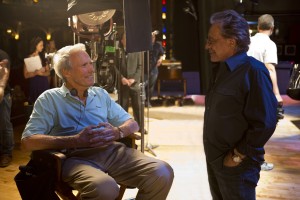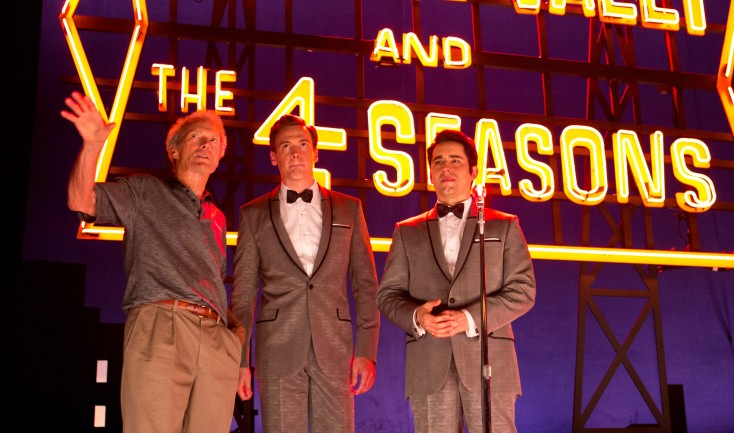
(l-r) Director/producer CLINT EASTWOOD with executive producer FRANKIE VALLI on the set of “JERSEY BOYS.” ©Warner Bros. Entertainment. CR: Keith Bernstein.
By ANGELA DAWSON
Front Row Features
NEW YORK—Clint Eastwood’s acting career was just getting into full swing when Frankie Valli and the Four Seasons rose to fame as a homegrown pop band in the early 1960s. Already an adult at that point, Eastwood’s musical taste leaned more towards jazz than pop music.
Nevertheless, Eastwood, who went on to become a successful filmmaker as well as actor, decided it was time to do a music-themed film a few years ago. He considered doing a remake of “A Star is Born,” but when that didn’t pan out, he agreed to bring to the big screen the Tony award-winning musical “Jersey Boys,” about the rise of the Newark-based band, whose hits included “Sherry,” “Walk Like a Man,” “Big Girls Don’t Cry,” among others. The one-time spaghetti-western film icon figured it would be an interesting challenge.
The 84-year-old director soon became a theater rat, attending various productions of the show, and scouting would-be stars for his big-screen version.
The four-time Oscar winner brings to the screen the story of four boys from the wrong side of the tracks, who rose to fame to become one of the most popular pop bands of the 1960s. Written by Marshall Brickman and Elice, the film stars John Lloyd Young, Erich Bergen, Michael Lomenda and Vincent Piazza as the harmonizing quartet.
Just across the Hudson River, Eastwood recently spoke about what drew him to helm “Jersey Boys” and how this California native became immersed in East Coast Italian-American culture of the 1960s.
Q: Why this movie?
Eastwood: It seemed like something to do. It’s funny I hadn’t seen the play but I’d heard a lot about it over the years. Somebody said, “Would you be interested?” and I said, “I’d be interested in looking at it.” They sent me the script, which was by a very good writer, and I found out later that wasn’t the script of the play. Only in Hollywood would somebody give you something else when they have a script that’s a hit. I saw three different version of the play in New York, San Francisco and Las Vegas, and saw those wonderful actors and that was that.
Q: Did you know Frankie Valli?
Eastwood: I met Frankie Valli years ago in passing and I met him over the years. I wasn’t a fan of music of that era because I came along before that. But I liked the Four Season a lot. Their music was far superior. “Can’t Take My Eyes Off of You” was a classic song and would have been a classic song in the ‘30s or ‘40s, or at any time in history. Their music was great fun. It was a pleasant challenge and I worked with the actors, who had great influence on the play through its run in the country, and using the original people.
Q: Your film explores the ethnic prejudice at the time in New Jersey. Did that aspect of the story also interest you?
Eastwood: In terms of (Four Seasons member) Tommy DeVito, it was certain stigmas of the time against Italian-Americans and transcending the borough from which they’re from. It created a fire for these guys to get out to make it. It was apparent in some of the scenes, getting out of the neighborhood.
Q: Had you thought about doing a music-related film before?
Eastwood: I’m was thinking of doing a remake of “A Star is Born,” of which I was a fan of the movie with Fredric March and Janet Gaynor, and I was interested in doing that from a modern-day standpoint. When this came along, I went to the head of the studio—the studio had been flirting with doing this project and passed on it. I thought, “Why would you pass on that? It’s such a popular play and still running, so there must be something there.” This was a lot more ready to go. “A Star is Born” is still incomplete, in my opinion.
Q: What were the big challenges of making a musical biopic?
Eastwood: It wasn’t too much of a challenge. You can open it up and it’s a wonderful play. I had a lot of excitement but approach it from a more realistic angle. When you watch the play, the actor has to put the chairs on the table and walk off the stage. There are a lot of things in a movie you can’t do. I just tried to open it up and give it a certain realism, maybe.
Q: Which of the characters in the Four Seasons can you can relate to?
Eastwood: I tried to relate to the whole thing. I grew up in a neighborhood and went to a school that was half Italian-Americans in an era where it was interesting in Oakland. So I thought I understood something about that community. I had a lot of friends in that community and called each other Dago—it wasn’t (politically correct). Like the song, “What a difference a day makes,” we’d sing “What a difference a Dago makes.” Yeah, it was a friendly and fun era. (He chuckles.) But you had a big understanding of the closeness of the Italian-American community.
Q: You incorporated those stereotypes and prejudices into the film, right?
Eastwood: We touched a little bit on that. You don’t forgive a lot of things, maybe cliches about the Italian community, like if you get on their bad side, you’re on the bad side forever. I don’t know if that’s true nowadays. I related to it, because of the people I knew in Oakland at that time, the friends I had. Then, I was going over to New Jersey where Tommy DeVito has a street named after him because of the play. There’s no street named after me in Oakland. (He chuckles.)
Q: You have a cameo on the film. Can you talk about that?
Eastwood: You mean my Hitchcock moment? That was Erich (Bergen’s) suggestion. We were talking about a scene where he’s watching television and it’s showing (Eastwood’s early TV series) “Rawhide,” and I thought, “Yeah, it could be.” Then I put it out of my mind. But somebody who handles our television stuff went ahead and (added it). Afterwards, I said, “I’ll live with that.” “Rawhide” was my first break after years of doing bit parts and unappealing roles and a chance to gain experience.
Q: How was this experience making a movie with pop music at the center of it?
Eastwood: I love films about musicians and in this case, singers. This one was easy because the guys were easy. I got a standing ovation for actually going to the men’s room when I was at the Broadway show. I thought that was the first time and probably last time that will ever happen. I had cast Michael (Lomenda, who plays Nick Massi) by that time. Erich, I attribute to Bob Gaudio. I asked him, “Of all the people who played you, who was the best?’ And he said, “Erich.”
Q: How did you cast Vincent Piazza, who plays Tommy DeVito in the film?
Eastwood: I had never seen (his series) “Boardwalk Empire,” but he did come in and was spectacular in the audition. I was worried about Vince, he was starting from scratch, but he fit right in.
Q: How did you end up casting John Lloyd Young, who plays frontman Frankie Valli?
Eastwood: By that time I saw him (playing the part on stage) I had seen three (productions of “Jersey Boys”). There were good guys in all of them, but (this) group came together so well. His 1,200 performances—that’s experience you can’t buy. I was just lucky. Casting a film is one of the most important things next to the writing. If you cast it properly everything takes place easily. Otherwise you’re fighting an uphill battle.
Q: In looking back on your experience making this film what can you say about being able to pull it off successfully?
Eastwood: There’s an old saying: I’d rather be lucky than good. I’ve been very lucky knowing these actors and watching them perform individually in different productions and seeing them altogether. At the time you go, “Okay, this is as good as it’s going to get.” If I can get a family together like this one, it’s very, very lucky. But I pay tribute to the screenwriters (Marshall Brickman and Rick Elise). The director is interpretive and the actors are interpretive. That you can start from zero and make something is always amazing to me. I’m lucky to have this great material.





